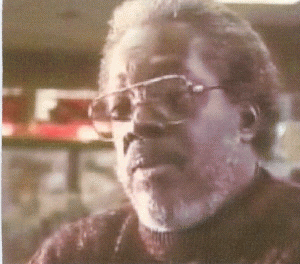Omaha Police officer Marvin McClarty
On August 17, 1970, an Omaha, Nebraska policeman, Larry Minard, was murdered in an ambush bombing at a vacant house. Two men, Edward Poindexter and Mondo we Langa (formerly David Rice), are serving life sentences at the Nebraska State Penitentiary for his killing. The pair were leaders of Omaha's chapter of the Black Panther Party. Most people assume justice was done in the case and little effort has been made by the news media to dig into the hidden aspects of the crime.
Poindexter has a new trial request pending before the Nebraska Supreme Court and an examination of the record, much of it still hidden by Federal Bureau of Investigation censors, reveals a dozen reasons to question the outcome of the trial.
New Trial Reason Three: Conflicting police testimony about dynamite--Jack Swanson
At the murder trial, a detective, Jack Swanson, alleged he found dynamite in the basement of Mondo we Langa's residence. Swanson's story was that he found the dynamite and that another detective, Robert Pheffer was with him. However, Pheffer testified he never went down into the basement and first saw the dynamite when Swanson carried up the stairs. The jury did not find the discrepancy significant enough to acquit the defendants. What the jury didn't know is that Pheffer would, years later, contradict his own trial testimony and claim, under oath, that he was the first one down in the basement and he found the dynamite not Swanson.
Omaha police officer Marvin McClarty was on duty the night of the search of Mondo's house. McClarty's suspicions that the dynamite was planted by the detectives were aroused that night. In the 1980's McClarty told a British film crew about his suspicions. "I had feelings they were out to get those two because they were probably the two that were the most vocal, they were the two the people viewed as guilty, the police did."
"I was on duty; we saw them bringing items out of the house. The thing that was so striking to me and to those two officers I was with was the fact the police had blocked off 29th to 30th on Parker Street, and they blocked that off to vehicular traffic and to pedestrian traffic. Then they said they found something in the house. To me and the other police officers, the first thing that strikes you that maybe is something is wrong here because of the way that search was conducted. That was when we drew our suspicions that it could have been something that was planted in that house. To this day I still believe it was planted in that house."
Swanson is dead now but before his death, he told the same British film crew about his role in the dynamite discovery stumbling over his words in a confusing contradiction of his trial testimony. "I was there, I found it, I didn't personally discover it but I was there when it was discovered and went right to where it was. It was there."
At the time of the search Swanson was in charge of another case against three men stopped in July with dynamite, a case kept out of the news. Conflicting police accounts of the amount of explosives seized could have left Swanson with as many as nine unaccounted sticks of dynamite at the time of the search of Mondo we Langa's house.
Swanson closed his interview with the British film crew with a vague and cryptic, "I still think we did the right thing."
New Trial Reason Four: Conflicting police testimony about dynamite--Robert Pheffer
Detective Robert Pheffer not only contradicted Jack Swanson at trial over whether or not he was in the basement of Mondo we Langa's house, he has since contracted his own trial testimony about who found dynamite.
At a 2007 hearing to consider Ed Poindexter's request for a new trial, Pheffer testified he was first one down in the basement and he found dynamite. When confronted by Poindexter's attorney, Robert Bartle, over the discrepancy between his 1971 testimony and his 2007 testimony, Pheffer became noticeably flustered and denied his own trial testimony claiming "the court reporter, somebody got it wrong."
Pheffer's new claim to have found the dynamite brings into question other 'evidence' allegedly found by the Omaha detective in the course of the investigation. Pheffer has testified to the discovery of other bomb-making supplies at two locations--claims not supported by the trial record or any police reports. Thus, the question of Pheffer's credibility hinges on whether or not police destroyed or hid evidence of bomb-making equipment allegedly found by Pheffer at two different locations. At the District Court where Pheffer's contradictions were on full display, Judge Russell Bowie dismissed the problem police testimony.
(Note: You can view every article as one long page if you sign up as an Advocate Member, or higher).





